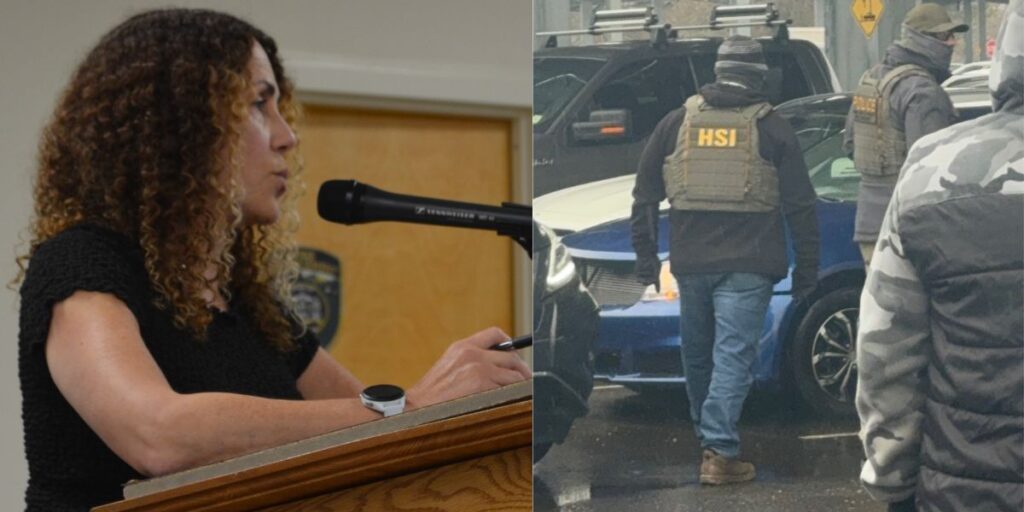Holocaust survivor shares her story of horror and hope at Riverhead Middle School

Four pebbles became a lifeline of hope for a young Marion Blumenthal Lazan during the Holocaust, one of the darkest periods in human history.
Ms. Blumenthal Lazan was only 4 years old when — along with her parents and older brother — she was sent to several concentration camps during World War II. During the harrowing 6½ years she spent in the Nazi camps, she created a game to cope with the horrors she and those around her were experiencing.
“I decided that if I were to find four pebbles of about the same size and shape then that would mean that the four members of my family would all survive,” Ms. Blumenthal Lazan told the audience of roughly 400 eighth graders at Riverhead Middle School on Thursday afternoon. “This game gave me something to hold on to, some distant hope.”
Ms. Blumenthal Lazan’s recounted her story of survival that began in December 1939 at Camp Westerbork in Holland, took her to the Bergen-Belsen concentration camp in Germany and then all the way to the United States in 1948.
“Mine is a story that Anne Frank might have told had she survived,” she said of the celebrated diarist who documented her experience hiding from Nazi persecution during the German occupation of the Netherlands in World War II. Anne Frank died at the Bergen-Belsen concentration in early 1945.
Ms. Blumenthal Lazan has shared her story with millions of listeners in 41 states and five countries, according to a press release sent by the school district. She is the subject of a PBS documentary “Marion’s Triumph” and has published a memoir, “Four Perfect Pebbles: A Holocaust Story.”
Her visit to Riverhead was prompted by recent incidents of swastikas drawn on desks and a blackboard at the district’s high school and middle school. Students listed with rapt attention as Ms. Blumenthal Lathan spoke of the unthinkable cruelty and inhumane treatment she and other prisoners endured in the concentration camps.
“Once a month we were marched to the area to shower and there, under the watchful eyes of the guards, we were ordered to undress,” Ms. Blumenthal Lazan said. “We had heard about exterminations and gas chambers in other areas of Europe, and we therefore were never sure when the faucets were turned on, as to what would come out, water or gas.”
Ms. Blumenthal Lazan has received multiple accolades for her efforts to improve Holocaust awareness and education. She received the New York Board of Regents Louis E. Yavner Citizen award, a special congressional citation and a designation as a New York State Senate Woman of Distinction. She has also received the keys to various cities in the United States, including Galesburg, Illinois; Owensboro, Kentucky and Idaho Falls, Idaho.

Riverhead Middle School Principal Joseph Pesqueira heard Ms. Blumenthal Lazan speak previously at Oyster Bay-East Norwich Central School District when he was social studies supervisor there.
“She has just such a wonderful message, is a wonderful speaker and I thought today she showed that again,” he said. “She connected with the students, told her story and it’s a story about hope, about courage, about her difficult experiences and how she overcame them and how she never gave up hope.”
Other guests from the school administration were also in attendance, including Interim Superintendent Cheryl Pedisich and Board of Education President Colin Palmer.
Mr. Palmer said this will be very helpful for the students once they begin to learn about World War II and the Holocaust later on this year.
“Having a basis to actually hear from someone who experienced it before, learning all these specific details, is going to help them so much,” he said. “They’re going to absorb so much more from their classrooms because they actually heard a survivor speak.”
After a brief question-and-answer session, Ms. Blumenthal Lazan, who will return to the school in February to speak to the seventh graders, ended her remarks to the class with positive messages, encouraging students to be kind to each other. She noted how students rely on so much new technology, and she implored them to always be respectful.
“So you see that despite all the terrible things that happened to me as a child, my life today is full and rewarding,” she said. “Although I spoke to upward of two million students and adults over these past 25 to 30 years, it still has not become easy. However, I do realize the importance of sharing that period of our history with you simply because in a few short years, we will not be here any longer to give a first-hand account; yours is the very last generation that will hear these stories first-hand.”

She reminded the students that they have an important responsibility in sharing these stories.
“I therefore ask you to please share my story, or any of the Holocaust stories that you do hear about, share them with your friends, share them with your relatives and, someday, share them with your children and yes even with your grandchildren,” she said. “When we’re not here any longer, it is you who will have to bear witness. As horrible as it is, the Holocaust must be taught, must be studied and kept alive. Only then can we rise.”









